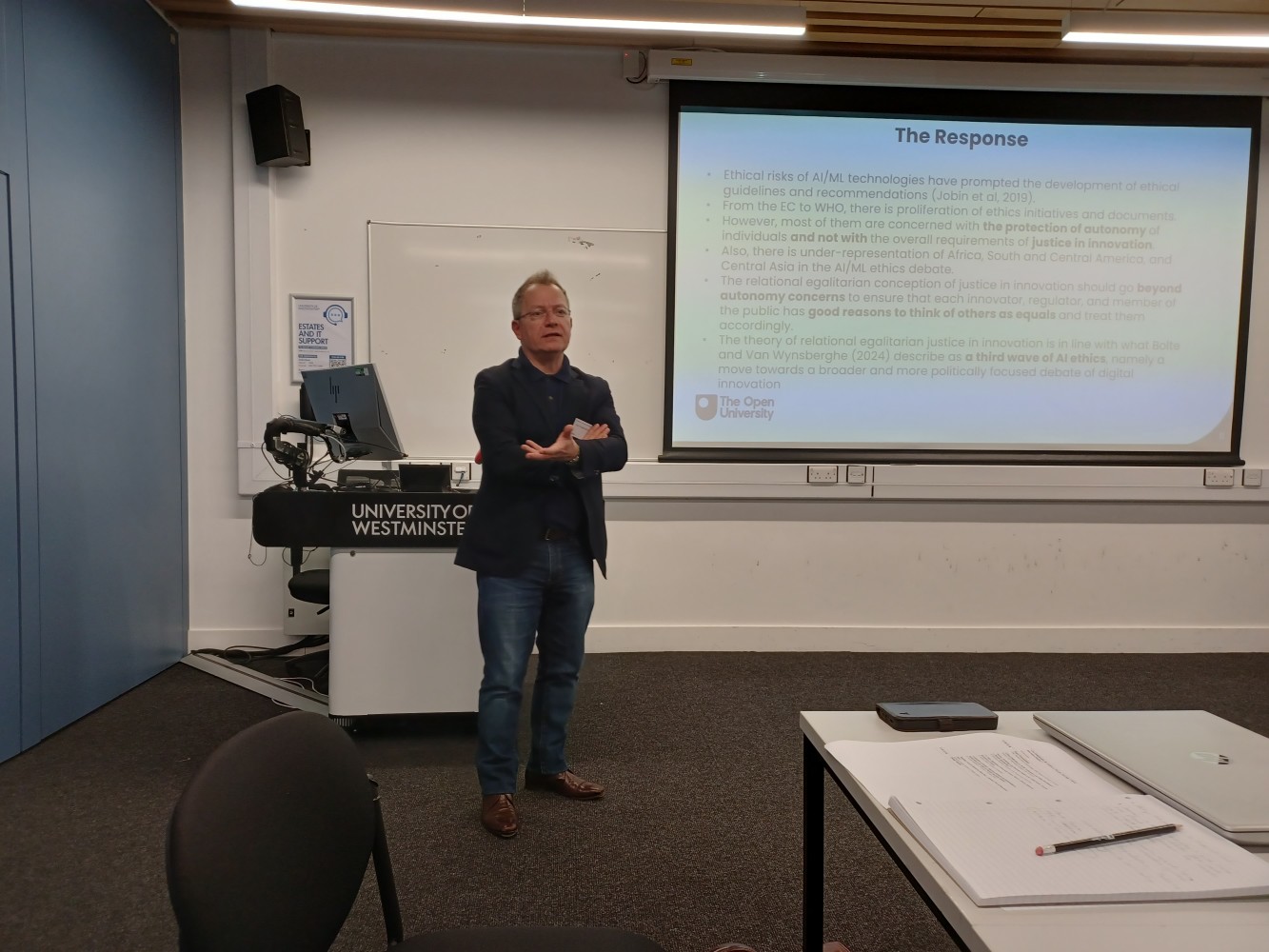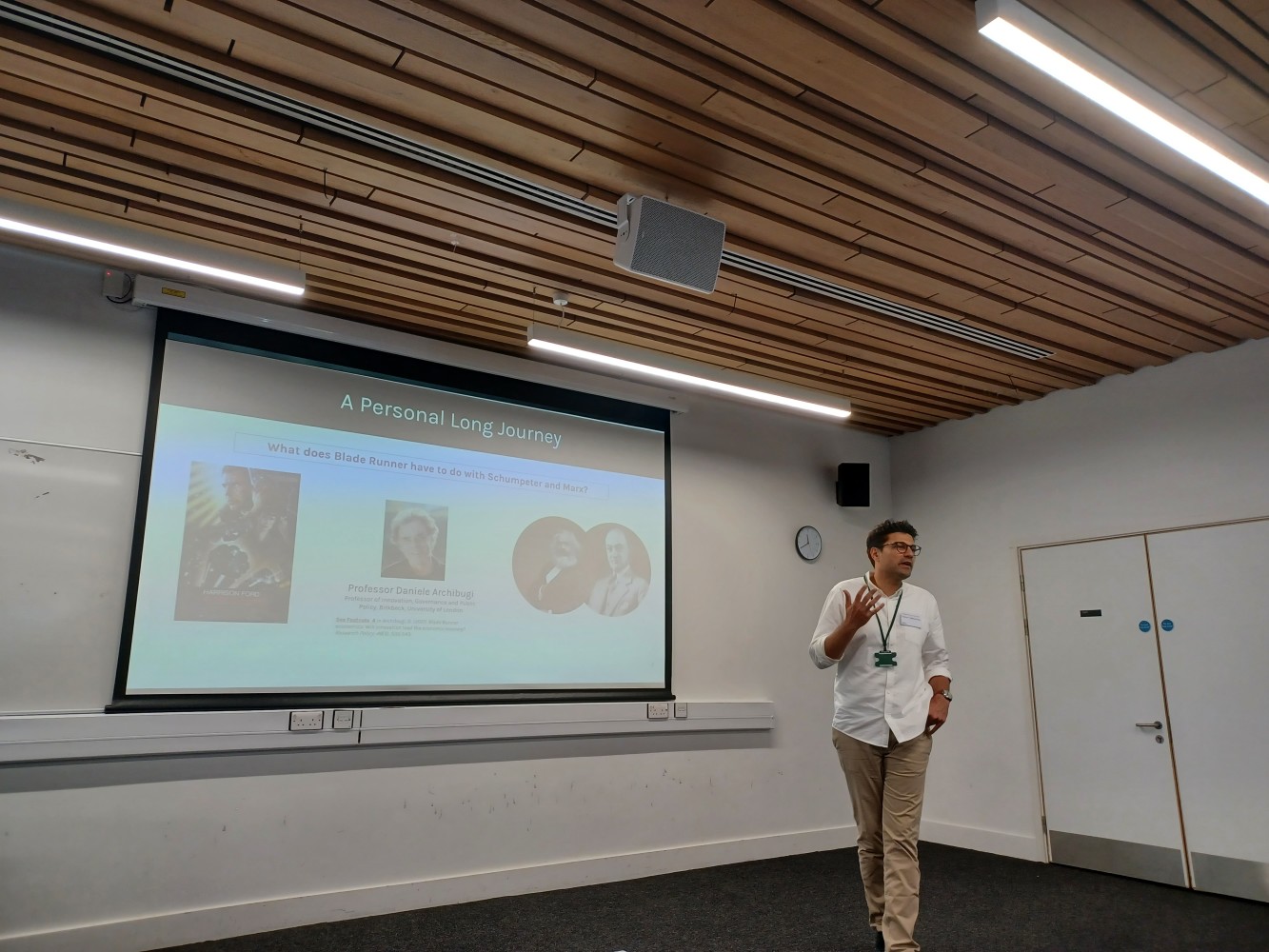Blog by Thanos Fragkandreas, Theo Papaioannou and Helen Lawton Smith
On May 28th the Centre for Innovation Management Research joined the ‘1st Critical Innovation Studies Workshop’ at the University of Westminster London, which was co-organised with Innogen, The Open University and The University of Edinburgh and Entrepreneurship Research Group, University of Westminster.
The event served three purposes. First, the workshop provided a platform for innovation scholars, early career and established researchers to exchange knowledge on how innovation studies can reinvent itself in a critical, yet socially relevant and impactful way. It also provided the opportunity for PhD students to take part in exciting discussions about the future of innovation studies.
It gave us the opportunity to reflect on the criticality of our work on innovation. The diversity of papers made the event very informative. They gave for very fruitful discussions of both theoretical and empirical work.

Honoring the Founders: The Legacy of Innovation Studies
A recurrent them was the debt owed to the ‘founding fathers and mothers’ of innovation studies. These are such people as Chris Freeman, Giovanni Dosi, Carlotta Perez, Richard Nelson, Nathan Rosenberg, Loet Soete. Their 1988 book, Technical Change and Economic Theory was a landmark compendium of the state of the art.
Like this workshop, this book represented a dissatisfaction with orthodox approaches to analysis – in that case it was analysis of change which ‘ignored the fundamental role and special character of technical change..’(ix). In this case the workshop brought together scholars who have dissatisfaction with the ways that the concept of innovation is uncritically treated in much of the academic literature.

Reinventing Innovation Studies: A Critical Approach
The nine papers explored topics ranging from in the morning from Challenge driven innovation, digitalisation, methodological approaches to measuring and predicting productivity differentials between firms and whether Schumpeter was a Marxist. The focus in the afternoon was on systemic approaches to innovation studies, including on AI/ML technologies and global development, a pluralist epistemology with reference to the global south, a critical application of innovation systems theory to African industrial development contexts, empirical mismatch and epistemological displacement in innovation systems, and a systematic view of innovation policy. Evidence was presented about the increasing quantification of innovation studies and the lack of critical interrogation of socio-political factors of innovation over the last decade.
Gamification in Innovation Education: A New Pedagogical Tool
Second, Westminster’s expertise in gaming innovation was introduced to the audience. The pre-lunch talk, Exploring Gamification as a Tool for Teaching Critical Innovation Studies” was given Dr Daphne Economou, Serious Games at Westminster Research Group, University of Westminster. This was followed by a post-lunch discussion involving Westminster students who have experienced this approach to teaching, led by Dr Spinder Dhaliwal, Entrepreneurship Research Group, University of Westminster.
Looking Forward: Reimagining the Critical in Innovation Studies
Third, the workshop was an opportunity for organisers to invite papers for a special issue of Prometheus, on Reimagining the Critical in Innovation Studies, edited by Professor Stuart MacDonald. The submission date for abstracts for this special issue has been extended to SI is extended to September, 30. Here is the link (http://www.prometheusjournal.co.uk/special-issues/)
The full programme event is below.
Event Organisers:
Co-organised by: Centre for Innovation Management Research, Birkbeck University of London;
Innogen, Open University and University of Edinburgh; Entrepreneurship Research Group, University of Westminster.
The organisers thank the University of Westminster for sponsoring this event.
Reference
Giovanni Dosi, Christopher Freeman, Richard Nelson, Gerald Silverberg and Luc Soete (eds) (1988) Technical Change and Economic Theory dosietal_1988_outline.pdf
Event Full Programme Agenda:
1st Critical Innovation Studies Workshop
Wednesday, 28th May, 2025 – Room: CG42 – University of Westminster
35 Marylebone Road London NW1 5LS (Google maps)
Co-organised by:
- Centre for Innovation Management Research, Birkbeck University of London
- Innogen, Open University and University of Edinburgh
- Entrepreneurship Research Group, University of Westminster
9:30-10:00
Arrival and registration (coffee & breakfast items provided)
10:00-10:20
Welcome from the Co-Organisers
- Dr Thanos Fragkandreas, University of Westminster & CIMR, Birkbeck University of London
- Professor Helen Lawton Smith, CIMR, Birkbeck University of London
- Professor Theo Papaioannou, Innogen, Open University
- Professor Stuart MacDonald, General Editor of Prometheus & Leicester University, UK
10:20-11:40
Paper Presentations
Chair: Professor Theo Papaioannou, Innogen, Open University
“On the Impossibility of Practitioner Work on Challenge-Driven Innovation: Discursive win-wins, Unresolvable Practical Trade-offs”
Dr Villa Takala, Institute for Global Prosperity, UCL
“Digitalisation and Firm Survival During the Covid-19 Pandemic in the UK”
Dr Sabine D’Costa, University of Westminster
“A Methodological Approach to Measure and Predict Productivity Differentials Between Firms”
Dr Thoralf Dassler, University of Westminster
“Was Schumpeter a Marxist? Reflections and Implications for Innovation Studies”
Dr Thanos Fragkandreas, University of Westminster & CIMR, Birkbeck University of London
11:40-12:10
Coffee break
12:10-12:30
Lunch Talk
“Exploring Gamification as a Tool for Teaching Critical Innovation Studies”
Dr Daphne Economou, Serious Games at Westminster Research Group, University of Westminster
12:30-13:30
Lunch
13:30-13:50
Post-lunch talk
Chair: Dr Spinder Dhaliwal, Entrepreneurship Research Group, University of Westminster
“Can Gamification Be Used as a Tool for Teaching Critical Innovation Studies?”
All participants
13:50-15:30
Paper Presentations
Chair: Professor Helen Lawton Smith, CIMR, Birkbeck University of London
“Critical Reflections on AI/ML Technologies and Global Development”
Professor Theo Papaioannou, Innogen, Open University
“Science, Technology and Innovation Studies in the Global South: Towards a Pluralist Epistemology?”
Dr Ogundiran Soumonni, University of the Witwatersrand, South Africa
“A Critical Application of Innovation Systems Theory to African Industrial Development Contexts”
Dr Geoffrey Banda, University of Edinburgh
“Contradictio in Systemis? Empirical Mismatch and Epistemological Displacement in the Study of National Innovation Systems”
Dr Yeoryios Stamboulis, University of Thessaly, Greece
“Modeling Catch-Up Beyond the Black Box: A Systemic View of Innovation Policy”
Dr Apostolos Vetsikas, University of Thessaly, Greece
15:30-15:40
Closing remarks